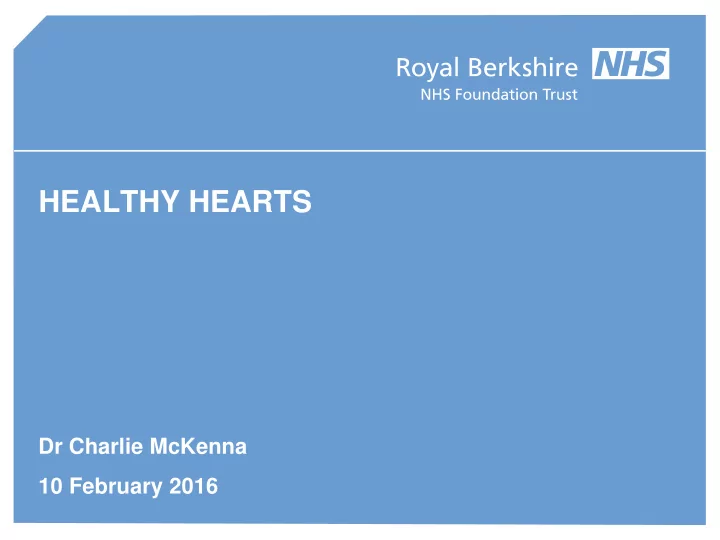

HEALTHY HEARTS Dr Charlie McKenna 10 February 2016
Help!
Heart Attack Centre
Who wants to live forever?
“Prevention is better than cure”
Coronary Artery Disease Primary cause of premature death in the UK 1:4 men and 1:5 women 1.4 million people with angina 300,000 heart attacks/year (1 every 2 minutes) 140,000 deaths/year (one 747 every day)
Coronary Artery Disease Cost the UK economy around £30 billion NHS £15.7 billion = 21% of total expenditure 250,000 working years lost due to mortality = £5.2 billion 70,000 working days lost due to incapacity = £7 billion 500,000 people provided informal care = £5 billion
Decline in the incidence of MI in British Men “The epidemic crested and began to fall” British Regional Heart Study; 7735 men aged 40-59 recruited 1978-80 and followed up to 2004. The hazard ratio of MI fell by 3.8% per annum (total=62%).
Decline in the incidence of MI in British Men Contributions Fall in cigarette smoking = 23% Fall in blood pressure = 13% Fall in cholesterol = 22% Rise in BMI = -7% No real change in physical activity or alcohol intake
Decline in the incidence of MI in British Men Age-adjusted hazard of first MI more than halved Half of this decrease explained by lifestyle and risk factor adjustment Other half: Modern care in hospital (25%) Secondary prevention in primary care (25%)
The statin conspiracy theory
Pleiotropic effects of statin therapy Statins improve prognosis by reducing event rates Originally prescribed to lower cholesterol Mechanisms of action wider than originally thought “Plaque passivation” - ↓ plaque rupture Improved endothelial function - ↑ NO Enhanced fibrinolysis, platelet antagonism
Lifestyle risk factors for CV disease
Pleiotropic effects of lifestyle Smoking/Poor diet/Inactivity Endothelial dysfunction Oxidative stress Inflammation Thrombosis Arrhythmia
Lifestyle risk factors A large proportion of health care expenditure is attributable to poor lifestyle behaviour. Emphasis on downstream risk factors, i.e. diabetes/hypertension/dyslipidaemia, addresses neither the root cause nor its full cardiovascular consequences. The impact on health of a single behavioural change - lifestyle monotherapy - is substantial.
Sugar and fat
Adolescent BMI as a risk factor The MELANY study (NEJM 2011;364:1315-1325) 38,000 USA military recruits followed up for an average of 17 years from initial induction medical (aged 17) BMI was a significant independent predictor of coronary disease (HZ 5.4) and diabetes (HZ2.8) As a continuous variable: Risk of diabetes increased by 10% for each 1 BMI unit Risk of proven CAD increased by 12% for each BMI unit
Adolescent BMI as a risk factor The MELANY study Only BMI in adulthood was associated with diabetes BMI in both adolescence and adulthood was associated with coronary disease Effect of BMI on diabetes is more reversible/functional than coronary disease which is more irreversible/anatomical
A fine balancing act
Recommend
More recommend